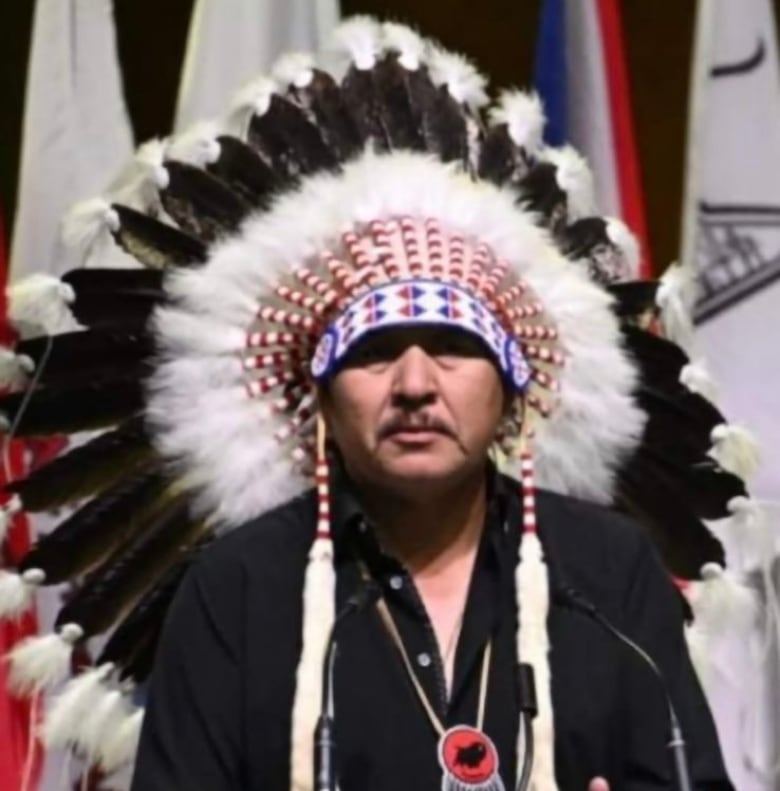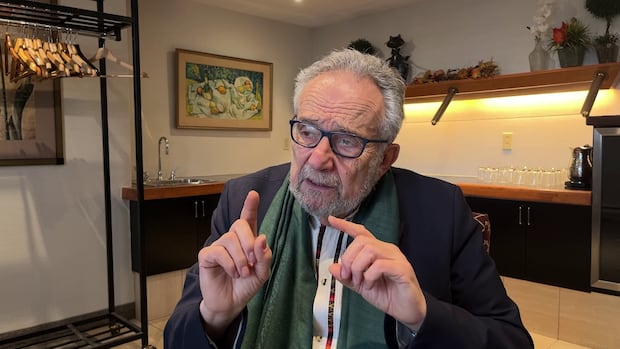Charles Hookimaw had one, simple question for the United Nations’ independent expert on water rights when they met in Toronto this spring: “How would you feel?”
How would you feel if you had to trudge through snow in the freezing, subarctic northern Ontario cold to get a jug of water from a reverse osmosis system just to make tea, like the elders of Attawapiskat First Nation do, Hookimaw asked?
That’s the situation the James Bay Cree community has faced for more than five years, Hookimaw told the official, after harmful levels of chemical disinfection byproducts, called trihalomethanes and haloacetic acids, were found in their tap water in 2019.
“We’re not even considered to be under any boil advisory,” Hookimaw told CBC Indigenous this week.
“Yet at the same time, we are being told to limit our use of the water in our homes, have a vent in your washroom, open the window, don’t rinse your food, don’t take long showers, don’t use the water on your babies.”
Here’s another place where we retrieve clean drinking water, which is located at the water treatment plant. You know, today, I didn’t feel like getting water, but I had no choice. Maybe <a href=”https://twitter.com/PattyHajdu?ref_src=twsrc%5Etfw”>@PattyHajdu</a> <a href=”https://twitter.com/gary_srp?ref_src=twsrc%5Etfw”>@gary_srp</a> <a href=”https://twitter.com/GregRickford?ref_src=twsrc%5Etfw”>@GregRickford</a> can get water for me next time! <a href=”https://twitter.com/hashtag/Attawapiskat?src=hash&ref_src=twsrc%5Etfw”>#Attawapiskat</a> <a href=”https://t.co/ywPwJZxzGX”>pic.twitter.com/ywPwJZxzGX</a>
—@CharlesHookimaw
The Attawapiskat member and community advocate wanted to know if the UN official would consider his basic human rights met, were he in their shoes. The answer is no — which Hookimaw said he was glad to learn.
“Even though there is no water advisory in place, the community’s human right to water is still not being fulfilled,” writes special rapporteur Pedro Arrojo-Agudo, in a report submitted to the UN Human Rights Council this September in Geneva.
Arrojo-Agudo is urging “profound changes” in Canada to ensure Indigenous peoples’ right to safe drinking water is upheld, particularly in the way the federal government provides infrastructure and funding to First Nations.
Attawapiskat is one of several communities where the official says the systemic non-availability of potable water violates basic rights. He says the Canadian government has international obligations that it can’t absolve itself of by offloading responsibilities.
Among other things, Arrojo-Agudo is urging Canada to publicly recognize the rights of all to safe drinking water, without any type of discrimination, noting Canada presently has no national legal framework to that effect.
“Although legislative advances have been made, significant barriers exist to realizing the human rights of Indigenous Peoples to water and sanitation,” he writes.
Canada ‘numb to the criticism,’ chief says
Chief Troy (Bossman) Knowlton, of Piikani Nation in southern Alberta, said this report puts a welcome international spotlight on long-standing domestic issues.
“These concerns from the oil sands and the water contamination, First Nations disease rates that are off the charts in certain areas, they’ve been there,” Knowlton said in an interview.
“And I think Canada has just become numb to the criticism. They hear it from multiple countries, multiple leaders, multiple environmentalists within our borders and outside our borders. And because they know it’s there, they seemingly just turn a blind eye, hoping that it’ll go away. Having the support is great.”
It means a lot to Hookimaw that his submissions were adopted, but the Attawapiskat member is skeptical it will lead to action.
“It will get ignored. But I think it’s going to give the First Nations, either my community or other communities, ammunition to fight back,” he said.
“It’s a good tool to use for getting our rights.”
Indigenous Services Minister Patty Hajdu was not available for an interview Thursday and a spokesperson did not provide a statement by publishing time. She responded to the rapporteur in April, when he delivered his preliminary report in Ottawa, by stressing the progress made under the Liberal government, pointing to the proposed clean water for First Nations legislation, Bill C-61.
Hajdu announced this week that the government successfully tabled an amendment to the bill that “recognizes the right to clean and safe drinking water on First Nations lands,” addressing a top concern from First Nations leaders.
Arrojo-Agudo, a physicist, economics professor and former member of the Spanish parliament, submitted his findings to the UN Human Rights Council during its 57th session.
Pedro Arrojo-Agudo, United Nations special rapporteur on the right to water and sanitation, talks about Canada’s failure to ensure safe drinking water on reserves.
Canada currently seeks to join the 47-state intergovernmental body for the 2028-2030 term. Both Hookimaw and Knowlton wondered what impact, if any, reports like these will have on that effort.
Arrojo-Agudo says he is deeply concerned, troubled and alarmed by the persistence of long-term boil water advisories, incidents of toxic industrial pollution impacting First Nations and reported repression of human rights defenders who oppose resource development without Indigenous consent.
The official says he found throughout his visit that Indigenous peoples’ right to peaceful protest and freedom of expression “had been breached through criminalization, repression and persecution, which undermined the trust and credibility of the reconciliation process.”
He also notes the devastating psychological impacts tainted water can have, including feelings of depression, isolation, hopelessness and the perception of being a second-class citizen based on one’s Indigenous identity.



